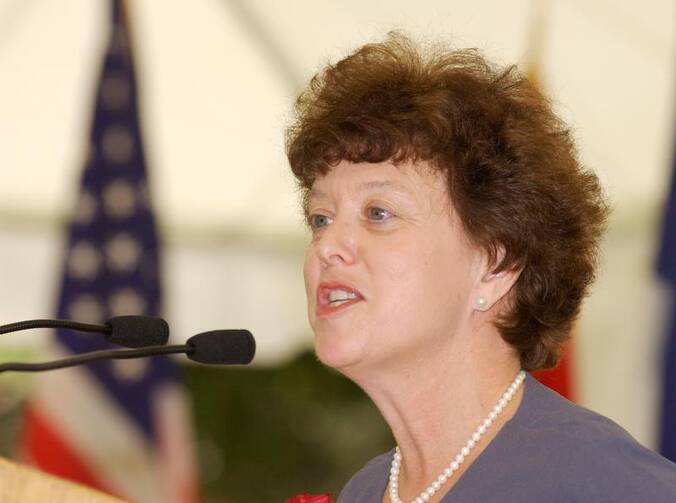MEXICO CITY (CNS) -- An expert witness has testified that the slayings of six Jesuit priests in El Salvador in 1989 was "premeditated" and preceded by campaigns to discredit the Catholic Church and the Society of Jesus.
"I believe that it was a premeditated act. I have a lot of information to show the premeditation," Terry Lynn Karl, a professor at California's Stanford University, testified July 13 during the trial of former Salvadoran Col. Inocente Orlando Montano. The trial is in Spain, because several of the Jesuits were Spanish citizens and Spain is exercising universal jurisdiction for heinous crimes. Because of COVID-19, Karl testified by video.
Montano, 77, is accused of planning the murders of six Jesuits, a housekeeper working for them and her daughter on the campus of a Jesuit university in San Salvador. He has pleaded not guilty.
"I'm going to say first that it was an attack against the church, the Jesuits and mainly against Father Ellacuria," Karl testified, referring to Father Ignacio Ellacuria, rector of Central American University.
"It started in 1977 in El Salvador and was a constant attack. I have an appendix of 34 attacks against the church that I sent to Col. Montano's trial, showing these constant attacks," Karl said, referring to two reports she authored on the slayings. "I think the most important thing to understand these attacks is ... that Montano himself carried out many of these attacks."
Karl cited several hostile actions prior to the Nov. 16 murders, including the names of three of the priests published on a hit list appearing in a newspaper. The army's radio station also broadcast threats against the Jesuits. Soldiers raided their home on the university campus, under the pretense of pursuing rebels.
"In my interviews with CIA agents or people from the National Security, who were working in El Salvador at the time, they called this a 'psychological operation,' because they said that it is not easy to send a soldier to kill a priest, especially in Latin America," she said. "You have to prepare the groundwork."
The murders occurred during El Salvador's civil war, which claimed 75,000 lives and officially ended with a peace agreement in 1992. It pitted right-wing death squads against left-wing rebels. Human rights abuses were rife.
In one of her reports, dated Dec. 31, 2012, Karl wrote, "Montano ordered, incited and assisted and or commanded troops that participated in a state strategy of terror against civilians," according to El Salvador media outlet El Faro.
The report was used previously in court against Montano, who resided in the United States and was extradited to Spain to face trial for the slayings of the Jesuits.
Along with Father Ellacuria, Jesuit Fathers Ignacio Martin-Baro, Juan Ramon Moreno, Amando Lopez, Segundo Montes and Joaquin Lopez were dragged from their home and killed in the attack.
Julia Elba Ramos, a housekeeper, and her teenage daughter Celina were also killed by soldiers, who simulated a firefight and attempted to pretend the attack was carried out by anti-government rebels.
"The attacks on the Jesuits came from a long time back. Montano considered them traitors," Karl said. "He was the leader of a campaign against the Jesuits in the days leading up to the assassinations," along with other senior officers.
Karl echoed the statements of previous witnesses, who said the motive for the killings was Father Ellacuria's role in facilitating peace talks.
The decision, she added, could not have been carried out by a single army officer or rogue soldiers. Col. Guillermo Benavides, former director of the military school, is the only person convicted of the crimes and is imprisoned in El Salvador.
"The decision to kill a person of such prestige is not taken ... without the consensus of the high command," she said. "It's impossible that Benavides did it, in my opinion."
She added: "This trial should be in El Salvador. With total respect (for the Spanish court) ... it shows impunity. It's incredible that the people involved and named in the trial are members of congress, have positions of honor, have a lot of money, and there is no justice."










